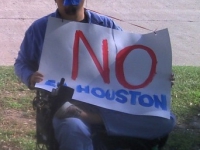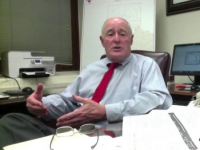Now that the dust has settled from the regular session of the Texas legislature, there is some good news to report on the issue of worker misclassification. The broad crackdown on the practice that's been called "a cancer" didn't materialize, but an important first step was taken. As Construction Citizen has reported, and garnered national attention for, the largest home builders fought tooth and nail to keep a comprehensive worker misclassification crackdown from happening. That bill pushed by Sen. John Carona, R-Dallas, would have aggressively gone after companies that misclassify their workers with a special focus on construction. But
AGC 2013 is celebrating 90 years in Houston. With that in mind, I sat down with AGC Houston President Jerry Nevlud recently at his office to talk about the road ahead for the construction industry in Southeast Texas. Nevlud, who's also a Construction Citizen blogger, told me things look good but the "elephant in the room" is the workforce and whether the industry will embrace private sector solutions for addressing it or wait for the government to take the lead.BRADDOCK: Jerry, given the economic conditions and everything else happening in this market, what's the outlook for the year ahead?NEVLUD: The outlook is great. I think that we're all very bullish on the Houston market for the next several years. I guess the, obviously with where the Eagle Ford Shale and what's going on and what the oil and gas companies are doing and so that creates a great base for construction and we've had several big bonds pass, so from that standpoint we're very bullish on the opportunities for our members. Obviously, the 800-pound elephant in the room is the
June 25, 2013
We've been telling you for months that a worker shortage is a reality and the evidence continues to roll in that we've been correct. YNN Austin now reports that the building boom...
June 18, 2013
“If a piece of the building falls to the ground and breaks, they have insurance for that,” said a middle-aged man in a wheelchair in Houston. I sat in a small portable building behind a church, listening through an interpreter as the man, I’ll call him Miguel, told the story of how his spinal cord was injured when he fell on the job building homes along the Gulf Coast. “But, if I fall off a roof and I break, they don’t have insurance for me,” he said. I paused a moment before asking him any more questions, letting that sink in.The Living Hope Wheelchair Association in Houston was founded to help men with these injuries who have no workers’ compensation. They’re under-funded, barely getting by thanks to the donations of churchgoers and caregivers. A small group of volunteers help these men and women with their most basic needs. And they know how to stretch a dollar. With meager donations, they’re able to buy things like catheters and diapers the injured workers need on a daily basis. As one volunteer showed me their supply, which he was proud of, I couldn't help but feel sorry for them. These are the kinds of things people would rather not have to talk about even if they have to use them. What struck me hardest is the fact that these people are hidden. People don’t talk about them because they've been used and abused. “A democracy can’t survive very long when it throws away its workers,” the volunteer said with an almost revolutionary tone in his voice.
June 13, 2013
As experts and industry leaders get a look at the specifics of the federal immigration reform bill being pushed in the United States Senate, the devil is beginning to emerge from the details. A headline that got our attention here at Construction Citizen was this from the Engineering News Record, or ENR: “Construction Debates Cap for Hardhats.” The piece lays out the raw numbers of what's in the bill versus what the industry needs. And the numbers don't add up.From the ENR report:Since mid-April, when the Senate’s bipartisan “Gang of Eight” unveiled an immigration bill stuffed with compromises and trade-offs, the construction sector has focused on the “W” visa, a proposed guest-worker designation that would limit to 15,000 the number of immigrants allowed to work in construction each year.
June 11, 2013
While lawmakers in Texas this year took a pass on a broad crackdown on companies that misclassify their workers, other states are ramping up their efforts. In Connecticut, for example, the state issued Stop Work orders to nearly 30 companies found to have been misclassifying their workers. The Connecticut Department of Labor says that they issued these Stop Work orders and slap penalties on companies that misclassify workers as independent subcontractors "with the intent of avoiding their obligations under federal and state employment laws covering such matters as workers' compensation, unemployment taxes and payroll reporting. The civil penalty for misclassification in Connecticut is $300 per worker for each day the employer does not carry workers' compensation as required by state law.While those numbers are significant, here's the real windfall from the state's efforts to deal
June 05, 2013
A bill to authorize more than $2 billion in construction projects at college campuses across Texas could get another shot at passage during the special session of the Texas Legislature. As the Houston Business Journal reported, the bill ran into problems at the end of the regular session, which concluded Monday in Austin. After the Senate passed its version of the bill, the House made changes and the two chambers didn't come to an agreement on what a final deal should look like. Lieutenant Governor David Dewhurst said that when you're considering such a large package of what are called "tuition revenue bonds," or TRB's, it's bad public policy to not have the House and Senate talking to each other about it. But now Kate McGee at KUT in Austin reports that Senator Kel Seliger, R-Amarillo, has re-filed the proposal and hopes that Governor Perry will get on board. By law, only the governor has the authority to add topics to the special legislative session. For now, Perry has said the legislature needs to focus solely on redrawing political maps.
May 31, 2013
Comprehensive workers' compensation reforms in Tennessee could end up being a model for the nation. A new state agency will be handling the claims and Governor Bill Haslam signed legislation that puts penalties in place for premium fraud. They're taking the workers' compensation claims out of the court system and handing it off to that new agency. This legislation was recommended by the Misclassification Advisory Task Force of Tennessee:"HB 551/SB 833 Administrative penalties for premium fraud: (1) Allows the labor department to fine construction service providers for workers’ compensation premium fraud. (2) Penalty money to be deposited into an enforcement fund and such fund can be used to purchase a data system for identifying potential violators and for hiring additional investigators.
May 29, 2013


The Peach State is moving forward with its plans to ensure, as much as possible, that workers are not undocumented immigrants. The law has been in effect for three years now and this latest move tightens the screws on employers even further.A major piece of the law, The Illegal Immigration and Enforcement Act, is the requirement that all employers with more than 10 workers on payroll must use the E-Verify system. Previously, employers with over a hundred employees had to do this. If they don't, they cannot obtain a business license in Georgia. This applies to all new hires and employers are not required to verify the immigration status of those workers who were with them prior to July 1, 2013.Attorneys in Georgia have been blasting emails to employers to offer their help with this, saying in part:The IIEA went into effect on July 1, 2011, but the E-Verify requirement was phased in over time. Effective January 1, 2011, the IIEA required all employers with 500 or more employees to attest to their registration and participation in E-Verify as a condition of obtaining a local business license.
May 23, 2013


Construction in Texas may be "cheap," but that's only if you consider the final price of the project. In most cases, the true costs are borne by workers, taxpayers, and society at large. Case in point: WFAA's David Schecter, a quality journalist who exposed worker misclassification in a North Texas school district, this week took the time to highlight the story of Guillermo Mata.From WFAA:In December, Mata shattered his leg after falling from the second story onto a concrete floor at construction site in Irving."Take me to Parkland (hospital),” Mata recalls saying after the injury.
May 14, 2013


















